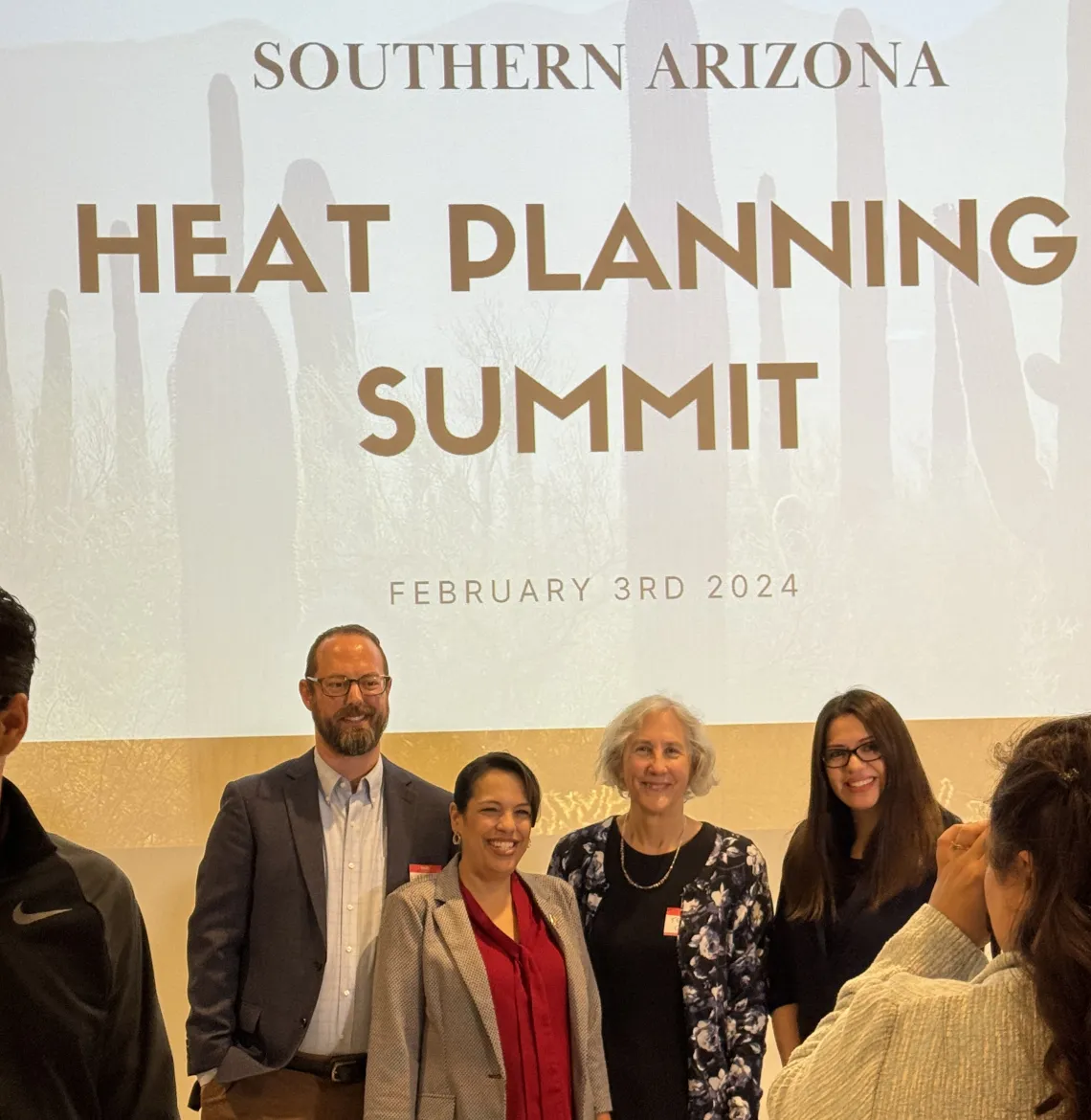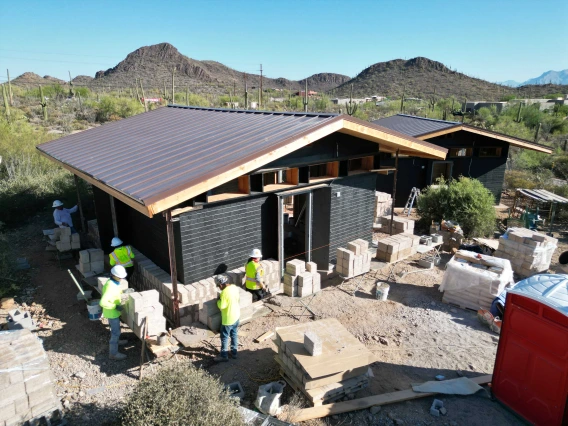2024 Southern Arizona Heat Planning Summit Invites Hot Takes on Addressing Heat from Community Members
The 2024 Southern Arizona Heat Planning Summit welcomed key decision makers and stakeholders to a day-long workshop to provide input on local efforts to address the negative effects of extreme heat.

From left, CAPLA Assistant Professor of Planning and Sustainable Built Environments Ladd Keith, Tucson Assistant City Manager Elizabeth Morales, Pima County Health Director Dr. Theresa Cullen, and City of Tucson Chief Resilience Officer Fatima Luna.
It was a chilly 46 degrees Fahrenheit and the ground was still wet with rain as city and county officials, UArizona faculty and other professionals working in heat-health-adjacent fields gathered at ENR2 for the 2024 Southern Arizona Heat Planning Summit.
The high temperature on February 3, 2024 never exceeded 57 degrees – a full 13 degrees cooler than the average February daily high in southern Arizona – which no doubt left some wondering why more than 100 individuals showed up on this particular Saturday to contribute to the City of Tucson, Pima County, and UArizona’s heat planning efforts.
“To me, this is the perfect day to have this event,” said heat health and governance expert Ladd Keith. “Because, if you wait until it’s already hot to plan for extreme heat, it’s too late.”
This is an all-too-common refrain for Keith.
In his roles as Assistant Professor of Planning and Sustainable Built Environments in the UArizona College of Architecture, Planning and Landscape Architecture (CAPLA), co-principal investigator of the southern Arizona portion of the $25 million Department-of-Energy-funded Southwest Urban Corridor Integrated Field Laboratory (SW-IFL) and Faculty Research Associate at the Udall Center for Studies in Public Policy, Keith spends a great deal of time talking about the threats posed by rising temperatures and offering guidance on what planners and policymakers can do to prepare for the challenges associated with extreme heat events.
Keith is also no stranger to interview requests from journalists writing about extreme heat. When temperatures soar in the Sonoran Desert during the summer months, it’s not uncommon for him to sit for several interviews with multiple national and international news outlets in a single day.
But, once temperatures drop in the fall and winter, the media appetite for stories about a warming world tends to diminish substantially, though the threats posed by increasingly common and widespread extreme heat events remain.
By all accounts, 2023 was the hottest year ever on record by a long shot and, not surprisingly, 2024 could shape up to be as hot or hotter. 2023 also saw a record number of heat-related deaths occur in the Phoenix area with at least 579 people losing their lives as a result of high temperatures.
“I think everyone here is probably aware at this point,” said Keith during his opening remarks, “but heat is the number-one weather-related cause of death in the United States. And, despite that, heat illnesses and deaths are still widely acknowledged to be under-reported.”
This, Keith says, is why it’s crucial for municipalities to plan for extreme heat well in advance of the hottest months of the year.
The 2024 Southern Arizona Heat Planning Summit was co-organized by the City of Tucson, Pima County and the UArizona CAPLA, the Mel and Enid Zuckerman College of Public Health (MEZCOPH) and the Climate Assessment for the Southwest (CLIMAS) program.
Graduate students from CAPLA and MEZCOPH also played roles as facilitators in the workshop portions of the event and are currently working to synthesize the results of those workshops into a final report.
The day-long session included opening remarks from Keith as well as Tucson Mayor Regina Romero (via a member of her staff), City of Tucson Chief Resilience Officer Fatima Luna, Pima County Health Director Dr. Terri Cullen and Tucson Assistant City Manager Elizabeth Morales.
“The City of Tucson partnered with the University of Arizona and the Pima County Health Department to organize and host this event…to bring together emergency managers, health practitioners, heat-related practitioners and community members to collectively brainstorm on the strategies and actions that will help us to be better prepared for heat waves,” said Luna.
“Essentially,” Luna told those present, “we want to learn from you – the practitioners on the ground, the workers and the community members who are exposed to extreme heat and those who are the most vulnerable to extreme heat.” Luna added that the information gleaned from the event “will inform the City of Tucson’s upcoming Heat Preparedness Response and Mitigation Strategy.”
Details of the day’s findings will also be provided to the Arizona Governor’s office, which is also working on a heat plan following Governor Katie Hobbs’ declaration of a heat emergency last summer.
After the morning presentations, attendees were divided into five groups that each focused on a different area of heat planning – such as heat and the built environment; public health; and energy and the grid – based on their chosen focus area or area of expertise.
Participants spent roughly two hours discussing the heat-related challenges impacting their area of focus and returned later in the day for another two-hour session dedicated to prioritization and idea generation for heat mitigation and management strategies.
“As a heat researcher and a local Tucsonan, this is a little bit of a dream come true,” said Keith of the event. “Everyone (in the room today) has been doing such great work (on addressing heat) individually, so I think the really exciting thing about today is to share some of that work and learn from each other so that we can really make this summer much more resilient than we were last summer as (the climate) continues to get hotter.”



